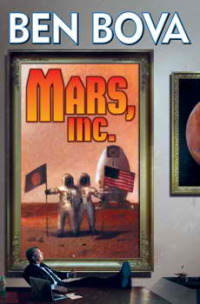Mars, Inc. by Ben Bova
 Wednesday, December 4, 2013 at 9:37AM
Wednesday, December 4, 2013 at 9:37AM 
Published by Baen Books on November 15, 2013
Mars, Inc. is a book about an aging man written by an aging man. It has the feel of 1950s science fiction. Sometimes that's a good thing. I like the "sense of wonder" that pervades a lot of 1950s sf and Bova captures a little of that here. But in style and content, Mars, Inc. seems like a novel written by a science fiction writer who is stuck in the past.
A billionaire named Art Thrasher persuades other billionaires to invest in a manned mission to Mars because ... it's the right thing to do? Bova's optimistic view of capitalism, and of the willingness of billionaires to spend billions on a project that is unlikely to return their investment, seems naïve, but that's the premise. Thrasher spends half his time complaining that politicians have devoted their lives to spending his wealth and the other half complaining that politicians aren't giving more funding to NASA. He doesn't have much insight into his own hypocrisy but most people don't, so in that sense Thrasher is a realistic character. The fact that he's an old horndog is the most interesting aspect of his personality. In most other respects, Thrasher is a pretty boring guy, despite Bova's effort to give him the feistiness of a Ross Perot.
Bova generally skips over the details of rocket design and manufacture, focusing instead (in a fairly simplistic way) on politics and finance. He does give us a tour of the spacecraft, a conventional vehicle that has been described by sf writers hundreds of times. Eventually the plot incorporates a mystery theme as Thrasher suspects the Mars project is being sabotaged and that someone is trying to take over his company. Bova invites the reader to select from the several suspects he puts on display. The method of detection that uncovers the culprit has more to do with wishful thinking than forensic science, and the reveal is less than surprising.
While sex gives Thrasher something to do in his free time (and something to think about the rest of the time), a subplot of romance that emerges in the novel's second half would be at home in an old, black-and-white television sitcom. It contributes to the story's dated feel. Apart from being stale, the story as a whole just isn't as interesting as science fiction should be.
Mars, Inc. certainly isn't an awful novel. It moves quickly and it's easy reading. Bova is a capable writer who knows how to keep readers turning the pages. The story lends itself to a sequel and I might even read it. This time out, however, Bova didn't write anything that hasn't been written before, and long ago.
RECOMMENDED WITH RESERVATIONS

